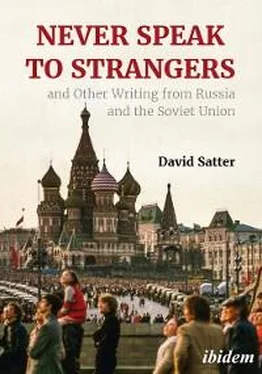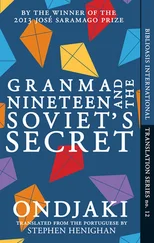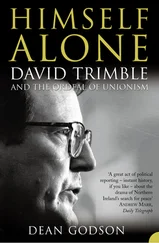The worker dissidents said in their open letter that they do not have philosophical objections to the Soviet system but simply wants its constitutional guarantees, such as the right to lodge complaints and the right to protection by the courts, to be honoured in practice.
Financial Times, Friday, May 19, 1978
Yuri Orlov’s Trial
The Price of Calling the Helsinki Bluff
The crowd outside the courtroom where Dr Yuri Orlov 1was being tried provided an uneasy audience for an animated debate between a dissident and a clean cut young man who was defending the Soviet system.
The argument ranged over the material situation of Soviet citizens and conflicting claims about freedom in the Soviet Union, and finally came down to the question of why close friends of Dr. Orlov were being barred from his trial.
“Who said that you are barred from the trial?” said the clean-cut young man. “I’ll go over there and get in now,” he added and began striding purposefully toward the iron barricades and crowd of militia men barring the entrance to the courtroom.
At the barricade, he was overheard by a Western correspondent to ask the police “what do I tell them? They want to know why they can’t get into the court.” One of the police, apparently taken aback by his co-worker’s stupidity, told him, “Tell them the hall is full.”
That was how it was during the four-day vigil on the sidewalk outside the “open” trial of Dr. Orlov. The testimony came from prosecution witnesses; the audience, with the exception of Dr. Orlov’s wife, Irina, came from the ranks of the country’s “enthusiasts”; and the honest workers who mingled menacingly with dissidents and journalists were provided by the police.
At the weary Press conference with Mrs. Orlova following the announcement of the sentence, Mr. Vladimir Slepak, a Helsinki group member who has been trying to emigrate to Israel for nine years, said: “All this was a play and all the sentence and everything was decided before the trial and what happened in the court had no influence on the sentence or the case.”
In retrospect, it now appears that not just the trial of Dr. Orlov but the Helsinki agreements themselves were a kind of play in which the Soviet authorities pretended that an ideological system imposed through force could honour solemn human rights commitments without undermining its own existence, and the Western signatories pretended to believe them.
At least 18 people connected with Helsinki agreement monitoring groups have now either been arrested or sentenced in various parts of the Soviet Union. Although attention has focused on Dr. Orlov, Alexander Ginzburg, and Anatoly Shcharansky, who were the founders and key members of the Moscow group, four members of an affiliated group in the Ukraine, including the Ukrainian poet Mikola Rudenko, have already been convicted of anti-Soviet agitation and received maximum sentences.
Dr. Orlov was in many respects well qualified to organise a dissident committee which sought to exert pressure on the authorities to translate public Soviet international commitments into genuine rights for Soviet citizens. A member of the Communist Party until his expulsion in 1956 for going too far at a party meeting in criticising the practices of the Stalin era, he moved to Armenia where he was able to find work as a physicist and in time became a corresponding member of the Armenian Academy of Sciences.
A specialist in high energy particle accelerators, Dr. Orlov returned to Moscow in 1972 and began work at the Institute of Terrestrial Magnetism and Propagation of Radio Waves but was fired after sending a letter in 1973 to Mr. Leonid Brezhnev, the Soviet President, in which he called for democratic reforms and connected the question with the campaign against Academician Andreo Sakharov.
Dr. Orlov became a member of the Soviet chapter of Amnesty International and in May 1976 founded the Helsinki monitoring group which for the first time drew together all the strands of Soviet dissent—the democratic movement, the Jewish emigration movement, and the religious rights movement—into a single organisation based on explicit Soviet acceptance of an international agreement.
In a country without a free Press, the Helsinki group quickly established itself as the best—and in many instances, the only—means of verifying whether Soviet pledges to honour freedom of religion and the right to emigrate, and to allow reunification of families, were being honoured in practice. The group demonstrated an ability to gather accurate, factual information on the Soviet human rights situation from sources all over the country.
Although Dr. Orlov’s trial was a trial of the Helsinki monitoring committee, the word “Helsinki” was never mentioned. The parade of prosecution witnesses—who apparently in the eyes of the authorities made defence witnesses unnecessary—demonstrated in their glowing encomia to Soviet power the kind of impartiality the West can expect if the Soviet Government is left to evaluate its Helsinki fulfilment record completely on its own.
The challenge to the Western signatories of the Helsinki agreement implicit in the trial of Dr. Orlov has been clearly laid down. The Soviet Union is not going to allow anyone to challenge the disparity between what it promises in international forums in order to appear respectable and what it will tolerate for fear of losing control. It is now up to the Western powers to decide how to react.
1Dr. Orlov, the leader of the Helsinki monitoring group was on trial for “anti-soviet agitation.” He was arrested in February, 1977.
Financial Times, Thursday, July 27, 1978
Soviet dissent after the trials
Shaken, but Ready to Rise Again
With sentencing of Dr. Yuri Orlov, Alexander Ginzburg and Anatoly Shcharansky, an uneasy sense of ideological calm has settled over Moscow. The Soviet authorities’ bid to destroy the groups set up to monitor the 1975 Helsinki accords has shaken the dissident movement, which never, in any case, contained more than a few hundred activists, and it will need time to reorganise.
However, it is virtually certain that the authorities’ attempt to crush dissent through long prison and exile sentences, but without full recourse to Stalin’s bloody methods, will fail.
With each wave of arrests and trials since the trial of the writers Andrei Sinyavsky and Yuli Daniel in 1966, the end of the dissidents has been predicted. On each occasion, they have resurfaced with renewed energy.
The resilience of Soviet dissent lies in the facts that it is both an inevitable response to the complete lack of individual political rights, and a specific subculture which, because its members have chosen to join it fully aware of the risks they run, is ineradicable under present circumstances.
The Soviet Union, although more tolerant than it was in Stalin’s time, employs intensive police surveillance, ubiquitous informers, eavesdropping and letter opening. The Soviet citizen has in practice no right to free speech or assembly, no ability to form independent organisations or to publish opposing opinions. As the trials of the dissidents demonstrated, there is no guarantee of due process of law.
The dissident movement has various elements—democratic dissidents, nationalists, the religious rights movement, Jews seeking to emigrate—but in general consists of people who have dedicated themselves to working for the creation of reliable political rights as the only means through which their other goals can be effectively realised.
The dissidents are self-selected. They know their activities will end their careers and could mean that they go to prison. The need to be prepared to accept the grim consequences is why the dissident movement is so small numerically, but also so wide in influence (almost everyone in the Soviet Union is aware of it) and so difficult to suppress. Any dissident gathering is peopled by those who have been to the labour camps or are soon to go, and they are hard to intimidate.
Читать дальше












